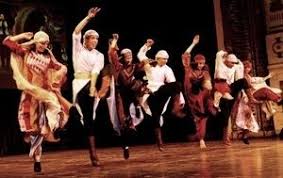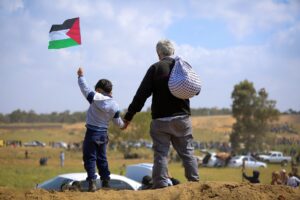
Dabka, a traditional dance
BY ISSRAA EL-KHATIB
Last November, I was invited to speak at Darcy Samek’s class at St. Mary’s University to explain more about Palestinian culture and history. It was a marriage and family therapy class that was interested in better understanding the context and values of Arab (Palestinian) immigrants specifically, and Muslims in general. As you can imagine, this was a very large context to cover in one presentation, so I focused mostly on my experience as a Muslim Palestinian American.
I walked the class through a lot of what it means to hold that identity. I started with the historical context of the Israeli occupation of Palestine, explained the difference between Zionism and Judaism, talked about conditions for Palestinians in the West Bank, Gaza and citizens of Israel. Then, I focused more on the cultural aspects and values, such as clothing, food, holidays, music, traditional dances like dabka, and values regarding marriage, divorce, parents and gender roles.
Finally, I went back to talk a little more about the occupation and how it impacts the Palestinian experience and shapes the cultural context due to the trauma. I talked about the restriction of movement, lack of access to water, the torture of children, and talked specifically about Hebron, Gaza and Jerusalem. Finally, I tried to bring it home by talking about the United States’ relationship with Israel and how our government’s continuous support has allowed the occupation to continue to this day.
In conclusion, I ended with symbols of Palestinian resistance and their determination to live with rights and dignity. I also provided the class with books and websites that they could use to learn more.
The reaction was so positive! I felt the love and support from the students and I really felt like I made an impact by bringing Palestine to a space that probably has never heard about it (or cared about it) before. It really showed me the power of conversations like this and how little it can take to bring a better level of understanding of something that may seem so foreign or complex. I did receive a little pushback from the professor who was trying to affirm that there is another narrative that is also valid. I tried to answer her questions to the best of my ability and kept the focus on the Israeli occupation and the human rights violations that affect Palestinians on a daily basis.

























